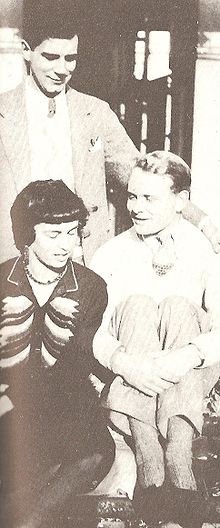Frances Partridge
Frances Catherine Partridge (15 March 1900 – 5 February 2004) was a long-lived member of the Bloomsbury Group and a writer, probably best known for the publication of her diaries.

Origins and education
She was the daughter of William Marshall, an English architect, and was educated at Bedales School and Newnham College, Cambridge.
Bloomsbury
Working at a London bookshop owned by David Garnett and Francis Birrell, she became acquainted with Lytton Strachey, Dora Carrington and Ralph Partridge. These three shared a Wiltshire farm-house, Ham Spray, in a complex triangular relationship that was recorded in the 1995 film Carrington. In 1921, Ralph Partridge had married Dora Carrington, who was in love with Lytton Strachey, a homosexual who was himself more interested in Ralph Partridge. An added complication was Dora Carrington’s intermittent affair with one of Ralph Partridge’s best friends, Gerald Brenan.
Ralph Partridge now fell in love with Frances. They lived in London during the week and repaired to Ham Spray at weekends. After Dora Carrington killed herself in 1932 over Lytton Strachey’s death, Ralph and Frances married and lived happily at Ham Spray until Ralph’s death in 1960. Their only son, Burgo, died not long afterwards. Frances sold Ham Spray and moved to London. Her writings, her membership of the Bloomsbury circle, her great personal charm and the energy that she retained into extreme old age together ensured for her a degree of celebrity towards the end of her life.[1]
Works
- The Greville Memoirs (Macmillan & Co, 1938), an editorial cooperation with Ralph Partridge (commenced by Lytton Strachey).
- A translation of Nothing is Impossible (Harvill Press, 1956) by Mercedes Ballesteros.
- A translation of Something to Declare (The Harvill Press, 1957) by Lovleff Bornet
- A translation of Blood and Sand (Elek, 1958) by Vicente Blasco Ibáñez
- A translation of The Naked Lady (Elek, 1959) by Vicente Blasco Ibáñez
- A translation of The Enemy in the Mouth: an account of Alcoholics Anonymous (Rupert Hart-Davis, 1961) by Joseph Kessel
- A translation of A Gap in the Wall (Collins, 1963) by Gabrielle Estivals
- A translation of The President (Atheneum, 1964) by Miguel Ángel Asturias
- A translation of Human Communication (World University Library, 1967) by J.L.Aranguren
- A translation of Napoleon's St. Helena (John Murray, 1968) by Gilbert Martineau
- A translation of The War of Time (Gollancz, 1970) by Alejo Carpentier
- A translation of Napoleon Surrenders (John Murray, 1971) by Gilbert Martineau
- A translation of Reasons of State (Alfred A Knopf, 1976) by Alejo Carpentier
- A translation of Napoleon's Last Journey (John Murray, 1976) by Gilbert Martineau
- A translation of Madame Mere: Napoleon’s Mother (John Murray, 1978) by Gilbert Martineau
- A Pacifist’s War (Hogarth Press, 1978), an account of Ralph’s and her life as pacifists during the Second World War. (Ralph Partridge had won a Military Cross and bar during the First World War.)
- Love in Bloomsbury: Memories (Victor Gollancz, 1981)
- Julia (Gollancz, 1983), a memoir of her friend Julia Strachey.
- Everything to lose (Gollancz, 1985), her diaries between 1945 and 1960.
- Friends in focus (Chatto & Windus, 1987), collected photographs.
- Hanging On (Collins, 1990), her diaries between 1960 and 1963.
- Other People (Harper Collins, 1993), her diaries between 1963 and 1966.
- Good Company (Harper Collins, 1994), her diaries between 1967 and 1970.
- Life Regained (Weidenfeld & Nicolson, 1998), her diaries between 1970 and 1972.
- Ups and Downs (Weidenfeld & Nicolson, 2001), her diaries between 1972 and 1975.
Footnotes
- ^ Durrant, Sabine (11 January 1999). "Frances Partridge, Bloomsbury groupie". Guardian Unlimited. Retrieved on 21 January 2008.
